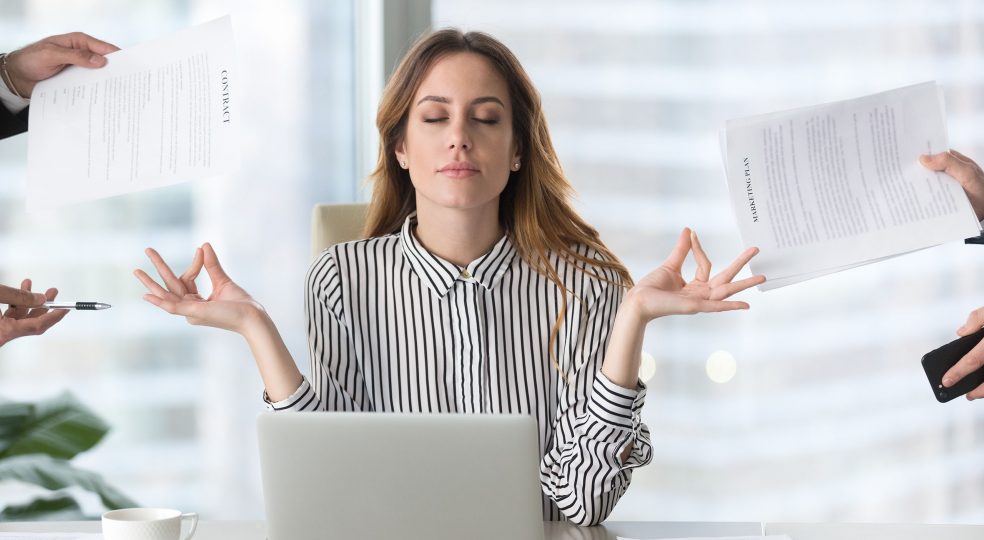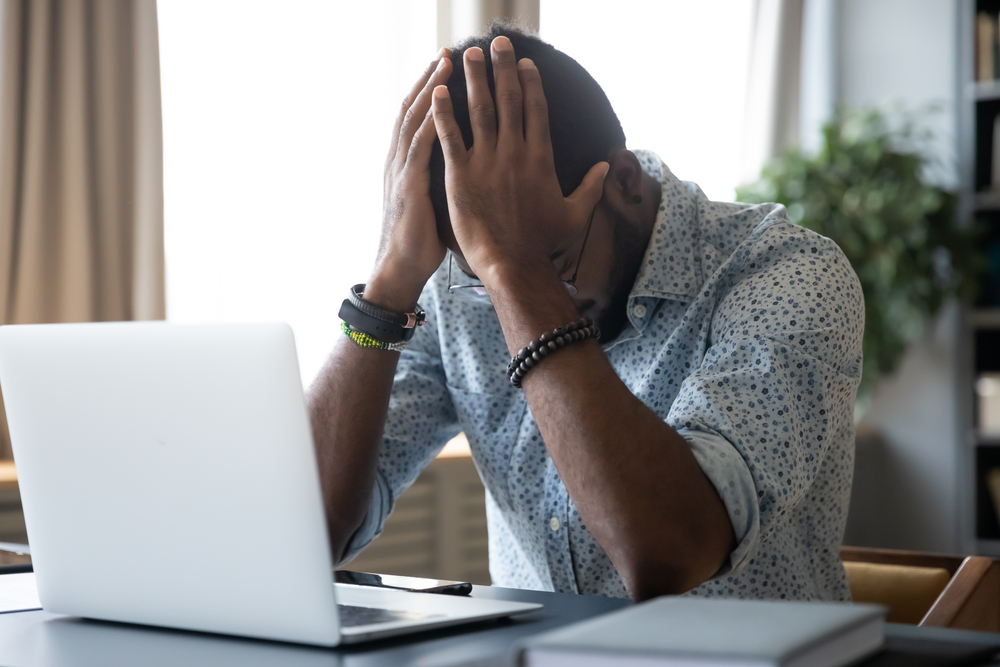
Being constantly under stress is part of everyday life for many people. This refers to an unpleasant feeling of time and performance pressure. You believe that you cannot meet the demands that you or others place on you. When people talk about wanting to reduce stress, they are referring to what is known as negative stress (disstress).
Whether at work or in family life - unfortunately, you can't completely prevent negative stress. It is part of life. However, it is important to learn how to deal with stressful situations in a healthy way. The first step is to identify your personal stressors. If you succeed in the latter, there are several methods to reduce stress. We will deal with this in detail in the following article.
Stress is a natural physical response that was essential for our ancestors to survive. When we feel stress, our body provides us with the necessary resources for fight or flight: Heart rate and blood pressure increase, your muscles tense, breath flows faster. Digestion stagnates - after all, it would be inconvenient to have to go to the toilet in a dangerous situation.
Now, in our modern society, the fight-or-flight response occurs at most figuratively. There is no outlet to compensate for the pent-up tension. If your body remains permanently in a state of arousal, this can seriously damage your health. It is therefore all the more important to find methods to constructively relieve pent-up stress.
Stress is by no means only negative. To a certain extent, it is even necessary to spur you on and make you perform well. A basic distinction is made between positive stress (eustress) and negative stress (disstress). The essential difference is that the disstress is associated with a feeling of Overload while disstress motivates you.
Typical examples of eustress are the excitement before a desired, yet impactful life event such as your wedding or the birth of your child. A musician before a performance or an athlete before a competition also usually feels eustress.
Disstress, on the other hand, is provoked by external, undesirable influences. Such situations take you by surprise, so that you feel helpless and unable to act.
Features of eustress at a glance

Features of Disstress at a glance

Eustress can develop into disstress under certain circumstances. Conversely, this is rarely the case. Let's say you have a special hobby: Writing, drawing, singing, or something in a craft. Now there's a chance to turn your hobby into a career. Suddenly you are no longer pursuing the activity in question for your personal fulfilment, but to earn money.
Certainly, there are many people who dream of doing just that and are very happy to be able to earn a living with their passion. However, some people lose the joy of an activity that they used to enjoy due to pressure to perform.
This phenomenon can be observed particularly often in talented children. As soon as a certain academic or athletic performance is expected under duress, positive stress (motivation and ambition) turns into negative stress (fear of failure, helplessness).
This is made clear, for example, in detail in the specialist book "Die Kinder Krankmacher - Zwischen Leistungsdruck und Perfektion" by Beate Frenkel and Astrid Randerath. Also a representative pupil inquiry of the Prosoz institute and the German child protection federation confirmed this thesis.
If you want to reduce stress, you first need to know what factors trigger negative stress in you. This can vary greatly from person to person.
The most common stressors include:
Once you have identified your personal stressors, you have already created the basic prerequisite for reducing stress. Now you can look specifically in which areas of your life you need to change something.
Continue to ask yourself to what extent your stress is "home-made". Is the situation really that bad or are you reading something into it unnecessarily? Do other people really expect you to perform at your best all the time, or do you put the pressure on yourself? Admittedly, answering these questions honestly is difficult, but helpful.
As previously mentioned, stress is a physical reaction and therefore clearly measurable. If we now look at the symptoms, it is important to distinguish between short-term and chronic stress.
Short-term stress leads to the release of the stress hormones adrenaline and cortisol. This increases your pulse, blood pressure and breathing rate. Your muscles are better supplied with blood, your senses sharpen. Obstructive bodily functions such as fatigue or the urge to urinate come to a temporary halt. Once the stressful situation is overcome, the body's functions regulate themselves again.
With chronic stress, the situation is different. Your body remains permanently on alert. This manifests itself in the following symptoms:
Chronic stress weakens your immune system, making you more susceptible to illness. In addition, the permanently increased blood pressure increases the risk of suffering a heart attack or stroke.
Mental illnesses are also favoured. Those who suffer from permanent stress often fall ill with depression or burnout. This is proven by the study: Chronic stress among adults in Germany.
So you see, chronic stress can have serious effects on your physical and mental health. Do not underestimate this! Learn again to listen to your body.

Certainly, it is not possible to escape your everyday life and all stressors from one day to the next. This is not even necessary. Sometimes even small tricks and changes, so that you can reduce your negative stress.

1. self-reflection
Self-reflection is the first step in making changes. Review your performance expectations of yourself and others. Are they realistic? Or do you perhaps detect a trace of Perfectionism?
2. give yourself courage
Positive Beliefs can seriously change your inner attitude. Instead of doubting yourself, you should repeatedly encourage yourself: I can do this! I am powerful! I can achieve everything I want!
Convince yourself of this and you will see that stressful situations will upset you less in the future.
3. resolve conflicts promptly
Hardly anything triggers as much stress as subliminal, simmering conflicts. Therefore: If there are disagreements, then address them promptly and ensure clarification. No matter whether it's between friends, at work or in the family. Unspoken conflicts usually come to a head unnecessarily, causing even more negative stress. This can be avoided through an open conversation.
4. avoid multitasking
Many people claim to have mastered multitasking. However, only very few actually succeed in doing several activities at the same time with full attention. Rather, there is a danger that you will get completely bogged down and thus come under time pressure. Instead, you should focus on completing one task after the other conscientiously.
5. plan breaks into your daily routine
In order to remain permanently efficient, your body and your soul need regular regeneration phases. If there are no breaks, concentration suffers. The quality of the work usually decreases significantly. You should be aware of this, especially in stressful phases.
Break times at the workplace are regulated by law and should be used. Do not work through the break out of false ambition, but use the time to recharge your batteries.
6. also be unavailable sometimes
Being constantly available prevents you from relaxing completely. After all, you almost automatically check your phone or email inbox because a message could be sent at any time.
Set fixed times when you are not available. Tell your friends and colleagues so that they don't worry.
7. reduce your time on the mobile phone and computer
Maybe you know it: You just wanted to check your mails and an hour later you're still sitting in front of the screen or fiddling with your smartphone. You lose a lot of time and energy that you could be using productively! Therefore: Limit the use of digital devices in your free time to a maximum of one hour per day, ideally less.
8. don't watch the news all the time
When you turn on the news, it seems to hail bad news. Crises, wars, crimes ... The input by news is rarely positive. Of course, it is right and important to keep yourself informed about what is happening in the world. But set times for this, e.g. one serious news programme per day.
9. reduce stress with sport
In this day and age, you can't counter stress with fight or flight as it was originally intended. Sport is the best way to get rid of the energy you have. It's best to choose a sweaty sport where you can really work up a sweat.
10. avoid rush hour traffic
Where do you find the most stressed people in one place? That's right: in rush hour traffic. To start the day relaxed, you should start before rush hour if possible. Have a relaxing coffee in the office before you start work, or set up your workstation, rather than slogging through traffic at the last minute.
Another option would be to ride your bike to work, as long as it's not too far. In this way, you integrate a sports unit to reduce stress at the same time.
11. reduce stress through sensible time management
Stress often arises when you get the feeling that you can't finish important tasks in time. In this case, a to-do list can help you to keep an overview. Prioritize your tasks and work through them one by one. Don't be afraid to ask for help when you feel like you're not getting it done. overwhelmed feel.
12. say no sometimes
In order to relieve stress, you have to learn to be able Saying no. Certainly, it is laudable if you want to help others. However, if you disregard your own NeedsIf you do not do favors, you will damage your health in the long run. Only grant favors to other people if you can really cope with them. If this is not the case, you can kindly refuse.
Sometimes it can help to offer alternatives. You don't have time to bake a cake for your friend's birthday? Then offer to get the drinks on the way or something similar.
13. treat yourself
Be appreciative and caring of yourself. This includes giving yourself a treat on a regular basis. This is especially true in stressful times. For example, reward yourself with a spa day after a hard week at work.
14. dive into strange worlds
Immerse yourself in the worlds of novels and films and leave your own everyday life behind for a while. If you have a creative bent, you can use this gift to create your own sanctuaries. Immerse yourself in writing your own stories, or in art or craft projects.
15. let your anger out
Shouting loudly, stamping your foot or punching your pillow - all of these are allowed and beneficial if you want to relieve stress. Don't let your anger eat you up from the inside. After venting your anger, you will feel better and be able to look at the situation rationally again.
Of course, you can't shout out loud at the workplace. Here we recommend a stress ball, which you can keep handy in your office drawer. When you're stressed, you can knead and squeeze it to your heart's content. We have more tips on stress management in the workplace in an article compiled for you.

Psychological stress is not infrequently due to a unhappy life situation. If you struggle daily with your job, your partnership or your appearance, your body releases stress hormones. Emotions like anger and Fear are almost always linked to psychological stress. The Ruhr University Bochum has published a study on this topic. insightful study published.
You can avoid psychological stress to a large extent by actively changing the circumstances that are stressing you. Sometimes psychotherapy is necessary for this.
In your daily life, make sure to give your unwanted emotions an outlet: Exercise, play a stress ball, or talk to people you trust about your situation. Furthermore, certain breathing and Meditation exercises help your inner peace quickly find again.
Your breathing has a great influence on your well-being. In stressful situations you breathe shallowly and frantically. Here, however, you can consciously take countermeasures to calm your body and mind again. After a short time you will notice how your heart rate normalizes and the tense muscles loosen.
Deep abdominal breathing for quick relaxation
Sit upright on a chair and place both hands on your belly. Your fingertips touch each other. Concentrate fully on the flow of your breath and feel how your abdominal wall rises and falls. Be sure to breathe slowly and regularly through your nose.
This breathing technique increases the amount of air you inhale. This optimises the oxygen supply to your body, which leads to rapid relaxation. You can perform this exercise unobtrusively at the workplace at any time.

The progressive muscle relaxation
Progressive muscle relaxation helps you to relax your stress-related tense muscles. Try to tense as many muscles as possible at the same time with your inhalation. Hold your breath for a moment. With your exhalation, release the tense muscles in a jerky motion. Repeat three to five times. You can do this exercise either sitting or lying down.
Reduce stress with the help of meditation
In addition to breathing exercises and progressive muscle relaxation, the following is also suitable Meditation the best way to let go of everyday stress. You will find a practical and detailed meditation guide here.
Stress in advance can only be avoided if you know your stressors. In order not to create unnecessary stress for yourself, we would like to come back to the tips we have already mentioned: A well-organised Time Management as well as the courage to say no sometimes, protects you from overload.
Give yourself time to think when someone asks you for a favor. Avoid spontaneous commitments that later turn out to be a stress trap. Take the time to calculate exactly which additional tasks you can and cannot accept. This is the only way to avoid stress in advance.

